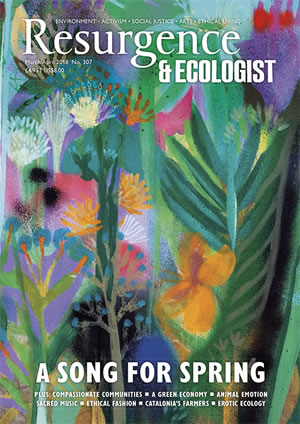As we know, ecology is a human construct in response to the devastation our species has caused to the planet’s biosphere, of which we are an integral part. It’s the kind of self-consciousness that no animal would entertain. The eco-philosopher Timothy Morton comments early on in his latest book – which sets out to reconcile Marxism with the non-human – “One of the principal enemies of what I here call humankind is humanity itself.”
He defines us as an “ecological being that can be found in the symbiotic real”, the latter being the ragged, rather messy set of interrelationships that makes up everything we know. ‘Nature’ is far too anthropocentric a term for Morton. As is, indeed, language itself, although here his attack on our use of ‘it’ to describe everything from badgers to coral is somewhat Anglocentric, since a language like French, for instance, doesn’t have a neuter pronoun.
Morton is an ontologist, adhering to ‘OOO’ (object-oriented ontology), keen to separate things from data. He believes Western society has attenuated the thinginess of the universe. Everything non-human is now outside in the sphere of the other – you can feel the tragedy of this in the Chauvet cave in the Ardèche (or rather its simulacrum) and its 36,000-year-old depictions of animals, not surpassed since. Morton would like us to show solidarity with the living and even the non-living world (rocks, for instance), with which we have at least the commonality of existence. I sense a fair bit of Tao in his approach, as well as Martin Buber’s ‘encounter’ in I and Thou (English translation, 1937). But he wonders what ‘having something in common’ actually means: deconstructionism – not assuming anything at face value – is also his credo.
His chief cavil is with agriculture, introduced in the Neolithic at a moment he calls “the Severing”– a term that he admits, in a typically rueful aside, is a bit “Game of Thrones-sounding”. This catastrophe means that we have “massive parts” of our social, psychic and philosophical space cordoned off from our consciousness. He adopts the French theorist Jean-François Lyotard’s approach with the notion of worlds being perforated and permeable, at which point in what was still his introduction I started feeling rather excited. The trauma of the Severing, our sudden lurch into farming (“agripolitics”), property, cities and thus large-scale warfare, has deepened into our current present alienation and the “desert landscape” of our world of mass extinction, where the “death drive rules”.
Morton is nothing if not disruptive, overthrowing comfortable assumptions on every page, especially for us Resurgence readers – as when he likens the thought behind Schumacher’s ‘Small Is Beautiful’ concept to the biopolitics “whose apogee is the Nazi concentration camp”. Sorry? Didn’t see that one coming! In fact, much of the thought in this book zips past before it can be digested or explained or justified, at least by the non-academic reader.
I found his argument ridiculously over-playful on one page, beautifully stimulating on the next. At its simplest, Humankind posits combining Marxism and animism, injecting anarchist thought into the fossilised stuff of social theory. Morton wants to ‘debug’ old systems. This could all be a recipe for something even more terrifying than the various communisms already tested; yet it might be what our hopelessly exploitative systems need, short of waiting for the dominion of the alt-right and robots when it all goes belly-up. He also criticises “current modes of ecological information delivery” for being “aggressive and apocalyptic”, preferring “futural” dreaming. Love, dreams and art are “where the true ecological chemistry lies”. If nothing else, you come away with a renewed respect for Marx and Engels as proto-ecologists.
Humankind is not a textbook to save the world, however. At times it feels like a case of attention deficit hyperactivity disorder. Yet this is, perhaps, partly the point. Morton strives to illustrate “how meaning is always spectral”, making the case for imagination (“dancing tables” and so on), subscendence (where the whole “is always less than the sum of its parts”), consumer products (“an interface between human reality and the symbiotic real”), individualism (“a mode of traumatised survival”), and, above all, kindness, where we need to include non-humans because it’s “fascinating” – I agree with this last when it’s beech martens in my roof, but not when it’s rats. See non-humans as neighbours, Morton suggests, not companion species. In my case, they are more lodgers than neighbours. It comes as no surprise when he finally suggests “silliness” as the mode for a new form of action, but by then I was as beguiled as much as I was maddened.






